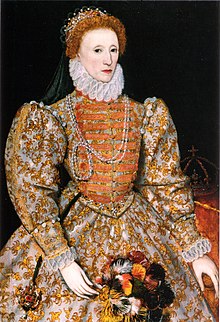Elizabethan
| 1558–1603 | |
 |
|
| Preceded by | Tudor period |
|---|---|
| Followed by | Stuart period (Jacobean era) |
| Monarch | Queen Elizabeth I |
The Elizabethan era is the epoch in English history marked by the reign of Queen Elizabeth I (1558–1603). Historians often depict it as the golden age in English history. The symbol of Britannia was first used in 1572, and often thereafter, to mark the Elizabethan age as a renaissance that inspired national pride through classical ideals, international expansion, and naval triumph over the Spanish — at the time, a rival kingdom much hated by the people of the land. In terms of the entire century, the historian John Guy (1988) argues that "England was economically healthier, more expansive, and more optimistic under the Tudors" than at any time in a thousand years.
This "golden age" represented the apogee of the English Renaissance and saw the flowering of poetry, music and literature. The era is most famous for theatre, as William Shakespeare and many others composed plays that broke free of England's past style of theatre. It was an age of exploration and expansion abroad, while back at home, the Protestant Reformation became more acceptable to the people, most certainly after the Spanish Armada was repulsed. It was also the end of the period when England was a separate realm before its royal union with Scotland.
The Elizabethan Age may be viewed especially highly when considered in light of the failings of the periods preceding Elizabeth's reign and those which followed. It was a brief period of internal peace between the English Reformation and the religious battles between Protestants and Catholics and then the political battles between parliament and the monarchy that engulfed the remainder of the seventeenth century. The Protestant/Catholic divide was settled, for a time, by the Elizabethan Religious Settlement, and parliament was not yet strong enough to challenge royal absolutism.
...
Wikipedia
